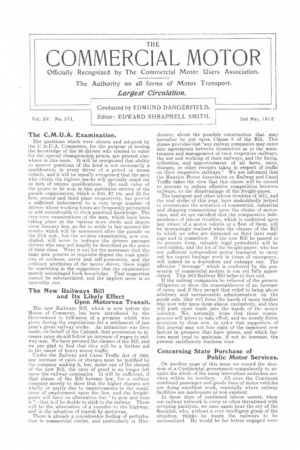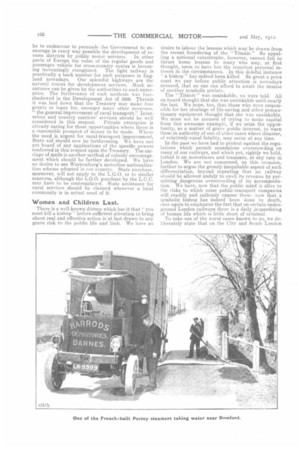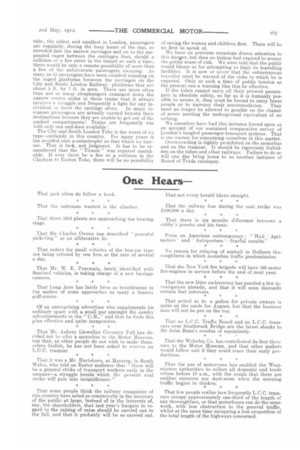The C.M.U.A. Examination.
Page 1

Page 2

Page 3

If you've noticed an error in this article please click here to report it so we can fix it.
The questions which were chosen and adopted by the Ci.lLA. Committee, for the purpose of testing the knowledge of the 90 drivers who elected to enter for the special championship prizes, are printed elsewhere in this issue. It will be recognized that ability to answer questions of the kind is not necessarily a qualification in every driver of a petrol or steam vehicle, and it will be equally recognized that the men who obtain the highest marks will specially stand out as men of unique qualifications. The cash value of the prizes to be won in this particular section of the parade organization, which is 210, 27 10s. and 25 for first, second and third place respectively, has proved a sufficient inducement to a very large number of drivers whose working hours are frequently protracted to add considerably to their practical knowledge. The viva-voce examinations of the men, which have been taking place at the various store sheds and depots since January last, go far to settle in fair manner the results which will be announced after the parade on the 27th inst., but the written examination, now concluded, will serve to indicate the drivers amongst drivers who may not inaptly be described as the peers of their class. Were it not for the assurance that the same men possess in requisite degree the road qualities of coolness, nerve and self-possession, and the ordinary attributes of the motor driver, there might be something in the suggestion that the examination merely encouraged book knowledge_ That suggestion cannot be substantiated, and the implied sneer is an unworthy one.
The New Railways Bill and Its Likely Effect Upon Motorvan Transit.
The new Railways Bill, which is now before the House of Commons, has been introduced by the Government in fulfilment of a promise which was given during the negotiations for a settlement of last year's great railway strike. An intimation was then made, on behalf of the Cabinet, that permission to increase rates should follow an increase of wages to railway men. We have perused the clauses of the Bill, and we are glad to find that they will be a further aid to the cause of heavy motor traffic.
Under the Railway and Canal Traffic Act of 1894, any increase of rates or charges must be justified by the company making it, but, under one of the clauses of the new Bill, the onus of proof is no longer left upon the railway companies. It will be sufficient, if that clause of the Bill become law, for a railway company merely to show that the higher charges are wholly or partly due to improvements in the conditions of employment upon the line, and the freightpaver will have no alternative but " to grin and bear it "—that is if he decide to stick to the railway. There will be the alternative of a transfer to the highway, and in the adoption of transit by motoryan. There is already a considerable feeling of perturbation in commercial circles, and particularly in Man
chester, about the possible construction that may hereafter be put upon Clause 8 of the Bill. This clause provides that "any railway companies may enter into agreements between themselves as to the maintenance and management of their respective railways, the use and working of their railways, and the fixing, collection, and apportionment of all fares, rates, charges, or other receipts taken in respect of traffic on their respective railways." We are informed that the Mansion House Association on Railway and Canal Traffic takes the view that this clause will be turned to account to reduce effective competition between railways, to the disadvantage of the freight-payer.
The transport and other labour troubles of 1911, and the coal strike of this year, have undoubtedly helped to concentrate the attention of commercial, industrial and shipping communities upon the claims of motorvans, and we are satisfied that the comparative independence of labour troubles, which is conferred upon any owner of a motor vehicle or a fleet of them, will be increasingly realized when the clauses of the Bill to which we refer are discussed on their later readings and in committee. If the new Bill be passed in its present form, valuable legal precedents will be over-ridden, and the lot of the freight-payer, who has not sufficient independent motor transport to carry out his urgent haulage work in times of emergency, will indeed be a dependent and unhappy one. The effective " leverage " which is conferred by the possession of commercial motors is not yet fully appreciated. This 1912 Railway Bill helps to that end.
If the railway companies be relieved of the present obligation to show the reasonableness of an increase of rates, and if they permit that relief to bring about arbitrary and unreasonable administration On the goods side, they will force the hands of many traders who now rely upon them almost exclusively, and they will push more trade into the hands of the motor industry. We, naturally, hope that these contingencies will prove to take effect, and we merely direct attention to them now, in order that supporters of this journal may not lose sight of the imminent new factors in prospect that have arisen, and which factors must tend to maintain, if not to increase, the present satisfactory business tone.
Concerning State Purchase of Public Motor Services.
On another page of this issue we record the decision of a Continental government compulsorily to acquire the whole of the many interurban motorbus ser
vices within its territory. All over the Continent combined passenger and goods lines of motor vehicles are doing excellent work, especially where railway facilities are inadequate or non-existent.
In these days of continued labour unrest, when our railway network is every so often threatened with creeping paralysis, we once again hear the cry of the Socialist, who, without a very intelligent grasp of the situation, thinks he wants the railways to be nationalized. He would be far better engaged were he to endeavour to persuade the Government to encourage in every way possible the development of remote districts by public motor services. In other parts of Europe the value of the regular goods and passenger vehicle for cross-country routes is becom ing increasingly recognized. The light railway is practically a back number for such purposes in England nowadays. Our splendid highways are the natural routes for development services. Much assistance can be given by the authorities to such enterprise. The furtherance of such methods was foreshadowed in the Development Act of 1909. Therein it was laid down that the Treasury may make free grants or loans for, amongst many other purposes, " the general improvement of rural transport." Interurban and country carriers' services should be well considered in this respect. Private enterprise is already caring for those opportunities where there is a reasonable prospect of money to be made. Where the need is urgent for rural-transport improvement, State aid should now be forthcoming. We have not yet heard of any applications of the specific powers conferred in this respect upon the Treasury. The carriage of mails is another method of subsidy encouragement whieh should be further developed. We have no desire to see Wiirtemburg's motorbus nationalization scheme adopted in our country. State purchase, moreover, will not apply to the L.G.O. or to similar concerns, although the L.G.O. purchase by the L.C.C. may have to be contemplated. State assistance for rural services should be claimed wherever a local community is in actual need of it.
Women and Children Last.
There is a well-known dictum which has it that "you must kill a bishop" before sufficient attention to bring about real and effective action is at last drawn to any grave risk to the public life and limb. We have no desire to labour the lessons which may be drawn fronx the recent foundering of the "Titanic." So appalling a national catastrophe, however, cannot fail to thrust home lessons to many who may, at first thought, seem to have but the remotest personal interest in the circumstances. In this doleful instance "a bishop" has indeed been killed. So great a price must we pay before public attention is nowadays aroused, that no one can afford to await the demise of another symbolic prelate.
The " Titanic " was unsinkable, we were told. All on board thought that she was unsinkable until nearly the last. We hope, too, that those who were responsible for her shortage of life-saving and other precautionary equipment thought that she was unsinkable. We must not be accused of trying to make capital from this awesome example, if we seize the opportunity, as a matter of grave public interest, to warn those in authority of one of other cases where disaster, of relatively-equal fatality, may occur at any time.
In the past we have had to protest against the regulations which permit •scandalous overcrowding on many of our railways, and which yet, rightly we hold, forbid it on motorbuses and tramcars, at any rate in London. We are not concerned, on this occasion, further to argue the grossly inequitable aspect of such differentiation, beyond repeating that no railway should be allowed unduly to swell its revenue by permitting dangerous overcrowding of its accommodation. We have, now that the public mind is alive to the risks to which some public-transport companies will readily and callously expose themTIOW that a symbolic bishop has indeed been done to death, once again to emphasize the fact that on certain underground London railways there is a daily jeopardizing of human life which is little short of criminal.
To take one of the worst cases known to us, we deliberately state that on the City and South London tube, the oldest and smallest in London, passengers are regularly, during the busy hours of the day, so crowded into the narrow carriages and on to the suspended cages between the carriages that, should a collision or a fire occur in the tunnel at such a time, there would be only a remote possibility of more than a few of the unfortunate passengers escaping. As many as 13 passengers have been counted standing on the caged platforms between the carriages on the City and South London Railway—platforms that are about 5 ft. by 7 ft. in area. There are more often than not so ninny straphangers crammed down the narrow centre aisles in these trains that it always involves a struggle and frequently a fight for any in dividual to leave the carriage alone. In many instances passengers are actually carried beyond their destinations because they are unable to get out of the packed compartments! Trains are frequently run with only one end-door available : The City and South London Tube is the worst of its type—certainly in this country. For many years it has avoided such a catastrophe as that which we foresee. That is luck, not judetent. It has to be remembered that the " Titanic " was reputed unsinkable. If ever there be a fire or a collision in the Clapham to Euston Tube, there will be no possibility of saving the women and children first. There will be no first to speak of. We have on previous occasions drawn attention to this danger, but then no bishop had expired to arouse the public sense of risk. We were told that the public would blame us for attempting to limit its travelling facilities. It is now or never that the subterranean traveller must be warned of the risks to which he is exposed. Only at such a time of public tension as the present can a warning like this be effective.
If the tubes cannot carry all their present passengers in absolute safety, so far as it is humanly possible to assure it, they must be forced to carry fewer people or to increase their accommodation. They must no longer be allowed to gamble on the chance of never meeting the underground equivalent of an iceberg.
We ourselves have had this instance forced upon us on account of our sustained comparative survey of London's tangled passenger-transport systems. That is our excuse for concerning ourselves in this matter.
Overcrowding is rightly prohibited on the motorbus and on the tramcar. It should be rigorously forbidden on the tubes and other railways. Failure to do so will one day bring home to us another instance of Board of Trade catalepsy.




























